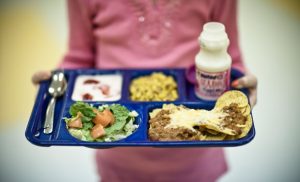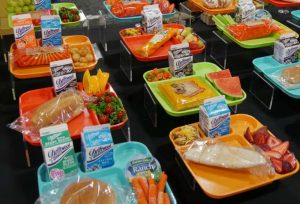Introduce your community organization and project objectives:
We are working with Tara and Vicky from the VFPC (Vancouver Food Policy Council). Our main objectives are to have an executive summary of the school lunch programs across British Columbia and to find out more about existing resources and policies that are implemented.
What is VFPC + Background:
VFPC is a Vancouver Food Policy Council located in Vancouver where it is an official civic agency that collaborates with citizens, experts and government officials. It acts as a bridge between the City Council and various local food programs available at BC Elementary and Secondary schools. In addition, there is a big organization called Coalition for Healthy School Food, which are comprised of 30 organizations that are seeking federal government investment with similar goal of creating healthy universal program for students across Canada. VFPC which is also a council with similar goals have joined with the Coalition for Healthy School Food in 2016.
The VFPC exists to provide ideas and make policy recommendations for how to reduce the food insecurity that still exists in Canada. Canada is one of the only G8 countries that do not have universal lunch program offered in schools. Therefore, VFPC saw significance in creating universal school program in Canada as well. However, forming a universal school lunch program is very broad approach and will involved many municipal, provincial, and federal policies regards to perspectives, finances and politics. Therefore, VFPC contacted LFS 350 students at UBC to collaborate this term. As mentioned, since providing universal lunch program is a general and broad approach, it was agreed with the VFPC that we will first research about current policies in BC and summarize relative policy documents that are available in Vancouver and British Columbia.
To know more about Vancouver Food Policy Council (VFPC):
http://www.vancouverfoodpolicycouncil.ca
To know more about Coalition for Healthy School Food:
https://foodsecurecanada.org/coalitionforhealthyschoolfood
Check out when VFPC’s monthly meetings are:
http://www.vancouverfoodpolicycouncil.ca/monthly-meetings/
Why did we choose this project?
We chose this project because one of our major interest regarding to nutrition and community is if students from elementary to secondary schools eat healthy meals during school. From the description of the project, it is said that more than 1 out of 3 elementary students and 2 out of 3 secondary students do not eat nutritious breakfasts, for example. Nutrition can be a crucial part for students learning and their ability to focus in class. Providing universal and nutritious meal programs for students is what VFPC is aiming at and parallels with our goals as well. We wish to gain more insight on the current school food system and what needs to be done so that every child has access to nutritious food during school.
What are our goals?
Our goal is to assist our community project leaders on improving the Food Policy here in BC by having a better understanding of the BC landscape as related to school lunch programs offered. Through this understanding, this can be extended to advocate for a universal school lunch program across Canada. We hope to be an asset towards our community project by providing research on the current situation of the BC Food Policy.
What are the objectives of our project?
Our objective is to develop a literature review to support policy making of the universal school lunch program including:
- To create summary report on current school food programs existing in BC including the name of the food program, the type of the program (breakfast, hot lunches, etc.), age group for the programs and where the program is being conducted.
- To summarize relevant policy documents (provincial or municipal) and publications by non-profit organizations in BC to stay updated on the current movement of food policies regarding school lunch programs.
Limitations of a national school food program and food justice?
A school food program is limited in that it ultimately can only address food justice in one aspect of the children’s lives, when they are at school. However, a school food program has more benefits that outweigh the cons and limitations associated with it. For example, it can help to address the big issue of food justice by providing every children equal access and shared equability to food. Eating a nutritious meal at school has other benefits such as improving academic success and better cognition (Food Secure Canada, 2015).
Describe first impressions of process to date (integrating the themes from Ernesto Sirolli’s TED Talk and the principles of Asset-Based Community Development + Food Justice)
First Impressions:
We are so exciting to be working with Tara and Vicky from the VFPC (Vancouver Food Policy Council). They are really passionate and knowledgeable in trying to create a universal food policy in BC. When we first met Vicky and Tara, we were impressed at how professional they were. They knew what they needed, the objectives we should aim for and how to collaborate with us. Apart from that, they gave us a brief background and the significance of the VFPC. It was so interesting in knowing how Canada does not have a universal food policy in regards with lunch programs. We really do hope that through this project, we are able to help Vicky and Tara be one step closer to having a universal food policy for all the children in Canada.
Connections to readings:
Based on the reading by Mathie and Cunningham (2010), Asset-Based Community Development (ABCD) is a strategy and approach for community development that is driven by local associations. ABCD focuses on social relationships and communication within the community. It links the community and civil society which will help us in expanding our boundaries to transform the food system so that food justice can reach students across BC. Providing lunch programs should be for food justice and not for profit. Through synthesizing this project, we can see the gaps that arise in the current BC schools food system and bring awareness to these issues to develop critical consciousness. Some of these issues include household food insecurity, namely how socioeconomic status can affect children’s health.
Food insecurity at a community scale is defined as:
“A situation in which all community residents obtain a safe, culturally, acceptable, nutritionally adequate diet through a sustainable food system that maximizes self-reliance and social justice” – (Dietitians of Canada, 2016)
Understanding the concept and importance of food insecurity will allow us to advocate for stronger school lunch programs. From this, it will be possible to take on the next steps of implementing sustainable, long term solutions.
Based on the TED Talk from Ernesto Sirolli, he mentioned that we need to “shut up and listen” to what community partners say and communicate in what are the changes they need and want. We should be active listeners so that this way, we can establish a relationship that matters. Another thing that one has to consider when providing aid to the community is respect rather than focusing on the profit side to establish a respectful relationship.
If you are interested in this video, you can easily access it by clicking in the video:
From these two resources that we have read and watched, we learned that communication is one of the most important factors when we plan to work with the community members. Therefore, for our project with VFPC, we plan to communicate as much as we can with the program members, and respect what the program wants from us rather than us implementing the idea in a one-sided aspect. Through constant communication, we hope to get the most optimal results where we will gain valuable community experience and contribute to the next steps of a sustainable program.
Stay tuned for our next blog post where we will be updating you with our proposal for the project!
____
References:
Food Insecurity Overview. (n.d.). Retrieved February 05, 2018, from
https://www.dietitians.ca/dietitians-views/food-security/overview.aspx
For a Universal Healthy School Food Program. (2015, March 19). Retrieved February 01, 2018, from https://foodsecurecanada.org/CHSF2015
Mathie, A., & Cunningham, G. (2003). From clients to citizens: Asset-based Community Development as a strategy for community-driven development. Development in Practice, 13(5), 474–486.



